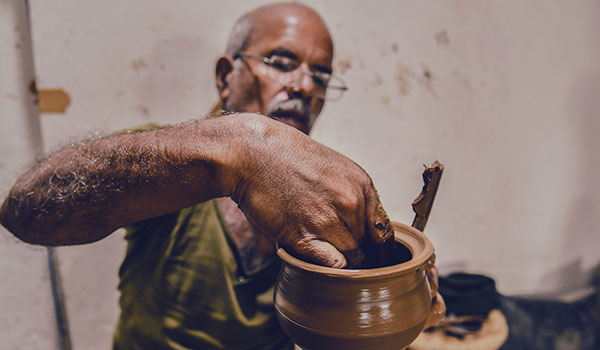The idea that Indian people, or any specific group, inherently smell bad is a stereotype and not based on factual evidence. Body odor varies widely among individuals and is influenced by several factors, including diet, genetics, personal hygiene, environment, and lifestyle.
Most Indian people work hard physically, and that’s why they smell. Physical work produces body heat and sweat, which is responsible for smell. It’s tough for most Indian people to change clothes and wash body frequently as they consume time, water, and money. Learn more about the facts below.
Why Do Indian People Smell?
The question about why Indian people smell is based on a stereotype and is culturally insensitive. However, a scientific angle to the perception of body odors applies universally and is influenced by several factors, including diet, genetics, and personal hygiene practices. Here are more details you should know:
Diet
Diet significantly influences body odor because the foods we consume can affect the chemical composition of our sweat, which in turn can impact how we smell. Traditional Indian cuisine is rich in spices like garlic, cumin, and curry. Compounds in these spices can be metabolized and then excreted through sweat, altering body odor.

Strong-Smelling Foods: Certain foods are known for their strong odors, which can be transferred to body odor. For example, foods like garlic and onions contain sulfur-containing compounds, which can be metabolized and released through pores. Spices commonly used in Indian cuisine, such as cumin, curry, and fenugreek, also contain compounds that can alter body odor when excreted through sweat.
Variation in Diets: Different cultures have different staple foods and spices, which can lead to different body odors among populations. For instance, a diet high in red meat is associated with a more intense body odor compared to a vegetarian diet.
Fat Content in Diet: The type and amount of fats consumed can also influence body odor. Certain fatty acids in food break down by skin bacteria, leading to body odor changes.
Alcohol and Caffeine: Consumption of alcohol and caffeine can also affect body odor. These substances can increase sweat production and alter its composition, impacting body odor.
Genetics
Genetic factors also play a role in body odor. For example, a gene called ABCC11 influences earwax type and underarm odor. Variations in this gene can affect body odor across different populations.

ABCC11 Gene: One of the most studied genes related to body odor is the ABCC11 gene. This gene determines the earwax type (wet or dry) and influences underarm odor. A particular variant of this gene, which is more common in East Asian populations, leads to dry earwax and less body odor. In contrast, other variants associated with wet earwax are linked to a stronger body odor.
Sweat Composition: Genetics also determine the composition of sweat. There are two types of sweat glands: eccrine and apocrine. While eccrine glands are mainly responsible for regulating body temperature, apocrine glands in areas like the underarms and groin produce a thicker sweat rich in proteins and lipids. The breakdown of these substances by skin bacteria leads to body odor. Genetic factors influence the activity of these glands.
Skin Microbiome: Each person has a unique skin microbiome—the collection of microorganisms living on the skin. Genetics can influence the composition of this microbiome, which in turn affects how sweat is broken down and what kind of odor is produced.
Hormonal Influences: Genetics also affect hormonal balances and responses, affecting sweat production and body odor. For instance, during puberty, hormonal changes that are genetically determined can lead to increased sweat production and changes in body odor.
Personal Hygiene
Personal hygiene practices, including regular bathing and the use of deodorants, can affect body odor. These practices vary widely and are influenced by cultural norms.
Bathing and Washing: Regular bathing or showering helps remove sweat, oils, and bacteria from the skin’s surface. Since body odor is primarily caused by the breakdown of sweat by bacteria, washing the skin regularly can significantly reduce body odor. The frequency and thoroughness of bathing can vary based on cultural norms, personal preferences, and lifestyle.
Use of Soaps and Body Washes: The soap or body wash can also affect body odor. Products with antibacterial properties can help reduce the bacteria on the skin that contributes to body odor. Some Indians prefer fragranced products that mask body odor, while others choose natural or unscented products.
Clothing: The type and cleanliness of clothing can also affect body odor. Natural fibers like cotton, wool, and silk allow the skin to breathe and sweat to evaporate, potentially reducing odor. In contrast, synthetic fibers trap sweat and odor. Regularly washing clothes, especially after they have been sweated in, is essential in managing body odor. The hot and humid climate in many parts of India necessitates frequent changing of clothes to maintain personal freshness.
Lifestyle Factors: Factors like exercise, diet, and environment can influence sweat production and body odor, and personal hygiene practices may need to be adjusted accordingly. For example, someone who exercises frequently must bathe more often to manage sweat and bacteria accumulation.
Environment and Lifestyle
The climate and an individual’s lifestyle (such as physical activity levels) can also impact how much they sweat, affecting body odor.

Climate and Temperature: Hotter climates or environments lead to increased sweating, which can intensify body odor. In tropical regions like India, where humidity and temperature are high, sweat does not evaporate as quickly, creating an environment conducive to bacterial growth. Conversely, less sweating generally leads to less pronounced body odor in cooler climates.
Physical Activity: Engaging in regular physical activity increases sweat production. While sweat is mostly odorless, the bacteria on the skin breaking down sweat can produce body odor. Therefore, Indian people who are more physically active experience stronger body odor and may need to adapt their hygiene practices accordingly.
Stress Levels: Emotional stress can also trigger sweating, particularly from the apocrine glands in areas like the underarms. This type of sweat is richer in proteins and lipids, which bacteria break down more readily, potentially leading to a stronger odor in Indian people.
Occupational Factors: Certain occupations involve more physical labor or exposure to heat, leading to increased sweating. Workers in such environments experience more pronounced body odor due to the nature of their work.
Personal Habits: Smoking or alcohol consumption can also influence body odor. Substances from smoke can be excreted through the skin, altering natural body odor. Alcohol consumption can lead to temporary changes in body odor as it is metabolized and released through sweat.
These factors are not unique to Indian people but apply universally. Cultural biases influence perceptions about body odor and do not reflect objective reality. There isn’t specific statistical data that isolates Indian people in terms of body odor, as this would be an ethically and scientifically questionable approach. In summary, body odor is a complex trait influenced by various factors and varies widely among people, regardless of their ethnic or national background.
Learn more:
Table of Contents
